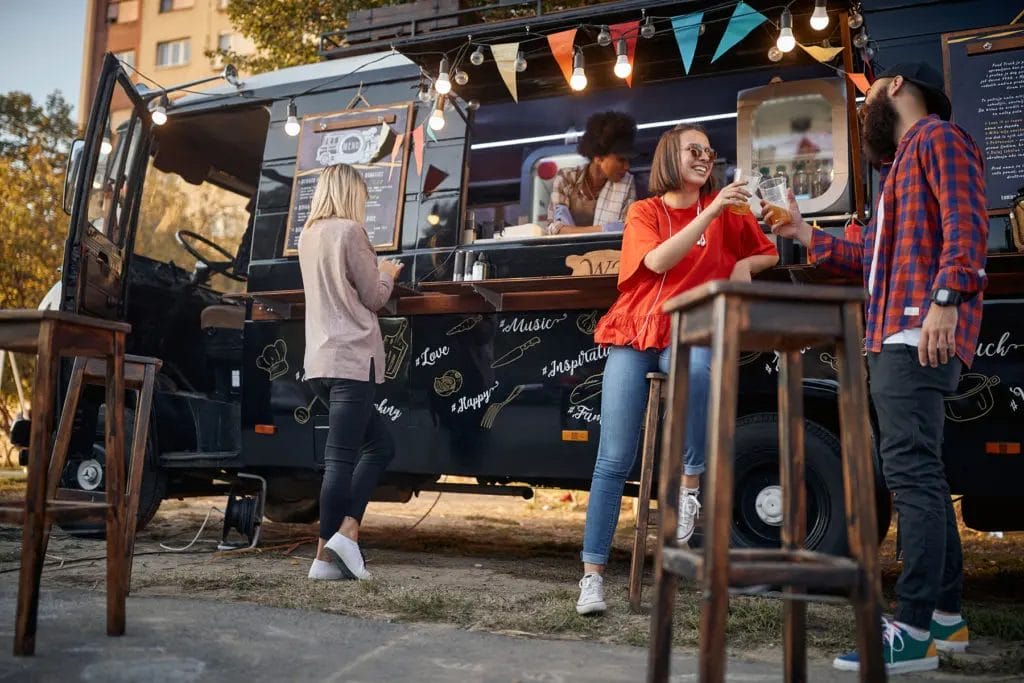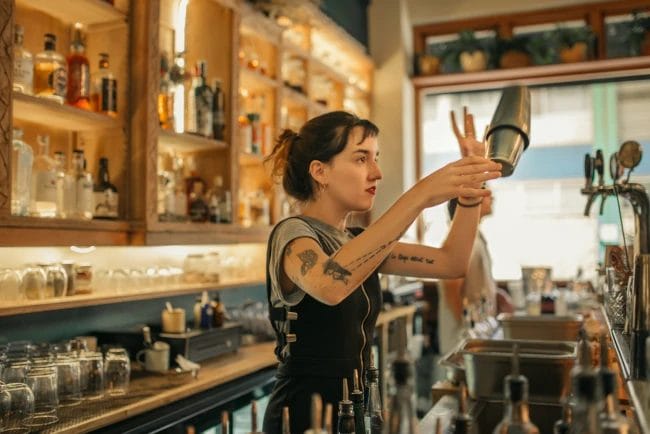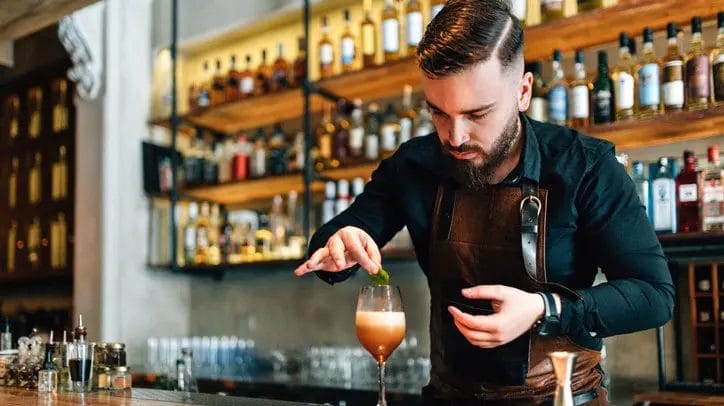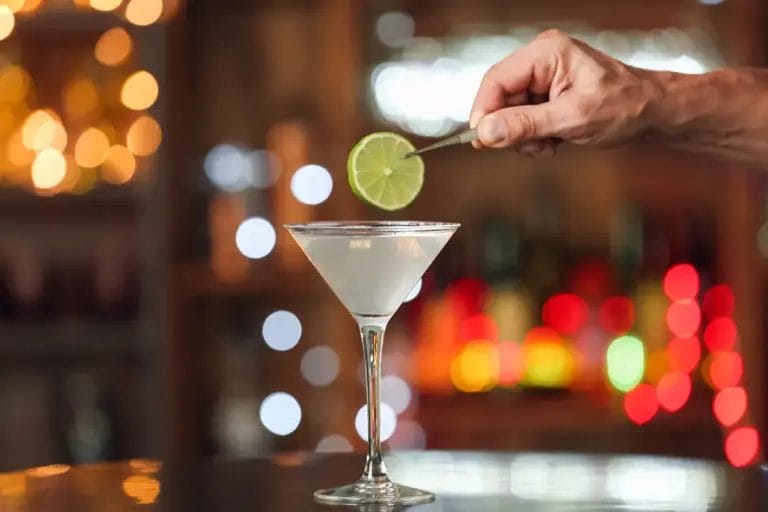How would you like a job that allows you to choose your own hours, make great money, and meet new people?
The flexibility and abundance of work make the private bartending industry a great option if you’re looking to take the next step in your bartending career. Whether you’re looking to make a few extra bucks on the side or you want to build a booming business, bartending private events offers plenty of opportunities.
Is Event Bartending Right for You?
If you’ve been working in lounges, restaurants, and clubs, you already have lots of valuable experience. But, event bartending comes with a slightly different set of opportunities and challenges.
Before you dive into a career in private event bartending, it’s important to understand if it’s a good fit.
Examining your soft skills, the demands of the job, and your earning potential can help you determine if this career path is right for you.
Who Makes a Great Bartender?
The best bartenders have skills and qualities that make them uniquely suited for their profession.
As an event bartender, you’ll need to level up and hone your abilities to meet each of your clients’ needs. After all, serving an elegant wedding has a much different vibe from a busy Friday night at the pub.
Take some time to reflect on your strengths to get a sense of how your abilities translate to event bartending. Here are a few important traits to consider:
- Good communicator. As a bartender, you need to communicate clearly and listen even better. Between taking orders, explaining the menu, directing staff, and chatting with customers, communication is the key to success in the service industry.
- Organized. When your bar gets busy, there’s no time for a messy or disorganized workstation. Bartenders need to keep their bottles, ingredients, tools, and glassware neat and orderly to provide optimal service.
- Confident. Mixing drinks and serving patrons requires confidence in your abilities. Second-guessing a recipe or how to interact with clients can slow you down or result in mistakes.
- Good memory. Bartenders need a laser-sharp memory for recipes, drink orders, repeat customers, and much more.
- Cool-headed. Stress comes with the territory when you’re a bartender. When the drink orders keep coming in, you have to stay calm while you’re cranking out cocktails.
It takes a special kind of person to juggle all of these valuable skills, but if you have what it takes, you can be a stellar private event bartender.

What Kind of Hours Do Event Bartenders Work?
It’s pretty common knowledge that bartenders don’t work 9-to-5, and private event bartending isn’t any different.
Bartenders are on the clock when most people are relaxing and unwinding. If you already enjoy this schedule, you’re in great shape!
Bartending private events offers even more flexibility than a standard bartending job. Instead of working a regular, scheduled shift, you get to pick and choose which events to cover, allowing you to design a schedule that fits your life.
This kind of flexibility means you can create a full- or part-time schedule that suits you.
How Much Do Bartenders Charge for Private Events?
Most event bartenders charge rates ranging from $30 to $60 per hour, which varies depending on the event type, date, size, and location. In addition to your hourly fee, you’ll also earn tips, which can increase your earnings by 5–20%.
Of course, what you charge also influences your income, and your pricing can vary based on several factors.
For example, how much you charge to bartend a wedding likely won’t be the same as your fee for a two-hour birthday party.
In terms of annual income, a private event bartender’s salary lands between $31,200 and $41,600, depending on your location and experience. Since you get to choose your own schedule, this also depends on how many events you work per year.
Like any event-based job, there will be slower months in which you will have little or no work. January, February, September, and November tend to have lower demand for event bartenders.
If this is your primary job, it’s important to save up and budget to account for these slower periods.

Understanding the Basics of Bartending
Before you can begin your career as a private event bartender, there are a few key things you need to get started.
Gain Experience
First and foremost, industry experience is a must. You can gain this by working in restaurants, or better yet, in bars.
Many bartenders start as barbacks, assisting and observing the pros while they earn their bones. You can learn how a bar functions, how to mix drinks, customer service, and gain other vital hands-on experience this way.
Learn Your Drinks
Serving drinks can be as simple as popping the lid off a beer bottle or as complex as mixing artisanal cocktails. Either way, customers expect you to know your stuff.
Experience is often the best teacher, so if you’re already working in a restaurant or bar, take this opportunity to learn the nitty-gritty details of mixing and serving drinks.
If you really want to dig into the ins and outs of mixology, bartending school may be a great option. While a formal education isn’t required for bartenders, it can help build your skills and give you an industry edge.
You can find both online and in-person bartending schools to fit your schedule. A program like BarSmarts offers both remote and practical training for budding bartenders.
Get Certified and Licensed
Before you start pouring, you’ll need the proper certifications and licenses.
Depending on where you live, you may be legally required to complete safety training, like TIPS or ServSafe.
Some areas may even have a region-specific course you have to complete before serving alcohol. Even if your state doesn’t require you to get certified, employers often do.
In addition to safety training, you might need a liquor license. This varies by state and sometimes city, so make sure to research your local laws.
For example, Washington requires anybody who serves, mixes, or sells alcohol to have a license, while Ohio only requires the employer or venue to have a permit.

Setting Up Your Business
Once you have the know-how, it’s time to set up your bartending business plan.
If you’re working for an event company or caterer, you may not need to name or register your business quite yet, but it’s always smart to plan for the future!
Pick a Name
Choosing a bartending business name is one of those things that seems like it ought to be easy, but it actually takes a lot of thoughtful consideration. Your name is the first thing customers see, so it should be memorable, catchy, and descriptive.
If you’re feeling stumped, try using a business name generator to help you brainstorm some ideas. You can also try generative artificial intelligence (AI), like ChatGPT, to develop potential names.
Once you have your name, consider registering it with the United States Patent and Trademark Office to ensure it’s protected and unique.
You’ll also want to apply for an Employer Identification Number (EIN) so you can file taxes for your business.
Register Your Business
The next step to becoming a bartender for private events is choosing a business structure.
If you’re working solo, you can operate as a sole proprietor. However, because bartending can be a higher-risk profession, you may want to establish an LLC to separate your personal assets from your business.
Now you can register with your local government, which you can do online or in person. Every state is different, so take some time to familiarize yourself with the local laws, requirements, and regulations.
Write Up a Contract
Your clients will expect you to have a contract outlining your services, prices, and any other necessary details. This protects both you and your customer, setting clear expectations and providing a legal safety net.
Consider hiring an attorney to draw up a standard contract for your business, or use a template to create a document.

Get Private Event Bartender Insurance
As a bartender, you know that serving alcohol comes with risk. An intoxicated customer can cause big problems that you could be liable for.
Before you begin booking gigs, you need to protect your business with bartender insurance.
Most states have dram shop laws that hold bartenders responsible if an intoxicated customer causes bodily injury or property damage.
If you accidentally overserve a guest or give alcohol to a minor, the financial consequences could be huge. Liquor liability insurance protects you from paying expenses like medical bills and legal fees out of pocket.
Gathering the Essential Tools and Supplies
Mixing amazing drinks requires the right tools. When you’re bartending private events, your venues may not have everything you need. While some places may have a fully stocked bar, other clients might expect you to bring everything.
Make sure you’re prepared by creating a kit that includes your essential supplies, like:
- Jigger
- Citrus press
- Muddler
- Wine opener
- Shaker
- Bar spoons
- Strainer
- Blender
You may also need to provide glassware or disposable cups. Make sure to include a clear statement about this in your contract and make arrangements with your clients ahead of time.
In addition to your hardware, you’ll need garnishes, mixers, and possibly alcohol (depending on the law where you live and your clients’ preferences).
Even if your client or venue provides the essentials, you should still bring less standard equipment or ingredients required for specialty drinks.

Booking Gigs
You have the skills—now you just need the clients!
When you’re just starting out, the best marketing is cheap or free. Here are a few ways to spread the word about your new event bartending business:
- Print business cards. You can get a box of business cards for less than $20. Hand them out liberally, leave a stack with local businesses, and pin them to every bulletin board you see.
- Build a website. Create a website for free through services like Wix or Canva, which guide you through the process. It doesn’t need to be fancy, but it does give customers a place to learn more about your business. You can also secure a domain name for about the cost of a latte.
- Word of mouth. Ask your friends, family, and satisfied customers to spread the word that you’re available to bartend private events. 92% of consumers trust word-of-mouth recommendations when making a buying decision.
- Social media. Create social media accounts for your business and post regularly. Share pictures of successful events, customer testimonials, and behind-the-scenes insight into your business to drive interest.
- Connect with other vendors and venues. When clients are organizing events, they often ask their existing connections for recommendations. Building relationships with other businesses in the event industry can help you book more jobs.
Ultimately, providing excellent service backed by professionalism and reliability will help you build a reputation as a private event bartender.
Starting small and working a few events can lead to a full calendar with a little hard work and dedication.
Start Your Journey to Become an Event Bartender Today
Choosing when, where, and how you work is a liberating experience. Bartending private events offers a healthy mix of independence, flexibility, and fun. What’s not to like?
Now that you have the information you need, you can jumpstart your bartending career. From weddings to corporate shindigs, there are plenty of opportunities out there for you to serve up some delectable drinks.





